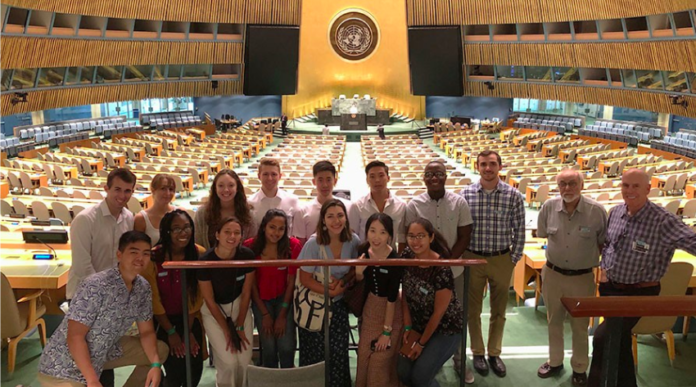With a month remaining in the fall semester, students participating in the Kahane United Nations Program (Oxy-at-the-U.N.) discussed their experiences spending a semester in New York City. Back on campus, program organizers are accepting applications for next year’s participants — Diplomacy and World Affairs (DWA) professor Laura Hebert and International Programs Office (IPO) Associate Director Marisa Grover Mofford hosted the final information session about Oxy-at-the-U.N. Oct. 31.
Over 400 students have participated in the Oxy-at-the-U.N. program since its founding in 1986, according to the program’s website. While in New York, students have a full-time internship at either a U.N.-related agency or a country mission and take two four-credit courses: “Human Development Task Force” and “United Nations and Conflict Prevention.” According to Hebert, the rigorous internships are usually filled by graduate students, and Occidental sponsors the only undergraduate internship opportunity at the United Nations.
DWA major Jack Fernandes (senior) is currently interning for the United Kingdom mission to the U.N. According to Fernandes, some of his many responsibilities include attending informal meetings involving resolution negotiations, organizing with the European Union (EU) on statements and conducting research for lobbying efforts. Fernandes said he was recently involved from start to finish working on negotiating a resolution for the protection of migrants. According to Fernandes, Occidental prepared him well for the various tasks he has had to attend to throughout his internship.
“Oxy has taught me to analyze and how to write well,” Fernandes said. “To be able to look at a variety of different issues and ask, ‘What are they really saying? What do they really want?’ You’re going to be pushed, but as long as you’re okay with that, you’re going to get a lot out of it.”
Although Oxy-at-the-U.N. is housed in the DWA department, Hebert said the selection committee encourages students from all majors to apply. Current participant Tom Englebert (senior), an economics major interning at the United Nations Institute for Training and Research, said he hopes more people will realize that the program is not just for DWA majors.
“I think that people tend to look at this as kind of exclusive to the DWA department,” Englebert said. “I think that it would be very interesting and beneficial to everyone if it got spread to more departments, so the approaches to classes, discussions, different topics and events could be approached from a multitude of angles instead of one or two.”
According to Mofford, students typically arrive in New York at the end of August. That gives them just a few weeks to get settled before the highly anticipated General Assembly, where world leaders gather for a week to work on an array of international issues. Fernandes said he was able to get tickets to hear Prime Minister of England Boris Johnson speak, and Englebert said Tijjani Muhammad Bande, the president of the U.N. General Assembly, spoke at one of the events he planned.
“I was sitting like 10 feet away from him, which is the closest I’ll ever be to him, and he’s a high-status person, so that was pretty cool,” Englebert said.
On campus, Hebert teaches the International Organizations course, one of the required prerequisite courses to apply to the program. According to Hebert, once students make it to New York, they become far more knowledgeable about how things work in the real world.
“They are in environments where they are really seeing global diplomacy playing out,” Hebert said. “It makes them more sophisticated about their understanding of global politics.”
Rhea Bhatia ‘19 said last year she interned at the U.N. under a new position in the United Nations Development Program (UNDP) Bureau for Policy and Program Support’s (BPPS) Gender team. Bhatia said one of the bigger projects she worked on was a global pilot project that launched community-based efforts in cities to get women involved in the conversation surrounding gender-based violence. According to Bhatia, the U.N. helped her find employment after graduating. Bhatia now works as a litigation and trial paralegal for the law firm Weitz and Luxenberg in New York.
According to Bhatia, the Human Development Task Force course specifically influenced what she pursued after Occidental. As a part of the course, Bhatia said the whole group went to Costa Rica, where they interviewed women in local communities who voiced their concerns about having no legal protection in the crop production farms where they worked.
“Part of my job in the project was researching laws that were in place to protect women against violence,” Bhatia said. “I realized as much as I loved working on policy and writing papers, I wanted to be on the ground representing these women. So I decided to take a U-turn and take my passion for gender and apply that to law.”
According to Bhatia, she maintained a strong relationship with the supervisors from her internship.
“I remember them asking me, ‘Hey, what do you want to develop in your internship that could be a tangible product to show when you’re applying to jobs?'” Bhatia said. “He [my supervisor] was very helpful.”
Bhatia said she recently spoke at a reception for Oxy-at-the-U.N. alumni, where she told the donors of the program that they are the reason she has a job.
The application is live and due Jan. 17, 2020. Hebert and Mofford said interested students should reach out to them if they have any questions.
![]()































